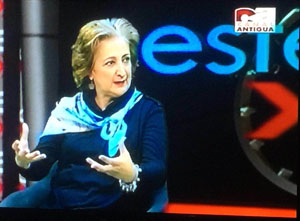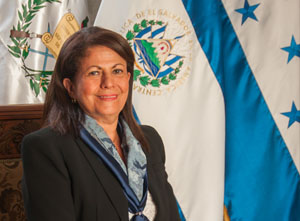
Elisa Colom de Morán, is a lawyer from Guatemala. She is a specialist in water legislation with extensive experience as a consultant in water policies and legislation and its relation to the human right to water and sanitation, climate change and other environmental issues for government agencies (executive and legislative, municipal governments), NGOs, international cooperation.
What would you say are the main challenges in your work as a woman?
- To be recognized for my professional skills
- Influencing engineers and economists in accepting that the management and governance of water occurs within a social context which determines its scope, and that it does not necessarily follow technical or theoretical economics – and that the laws are a reflection of that society as well as their virtues and iniquities.
What have you done to overcome these obstacles/challenges?
- Listen, learn, recognize that there are multiple approaches and positions; be consistent with my approach; and persevere.

Miriam del Carmen Hirezi de Meléndez, is a Salvadoran economist. She is the Executive Secretary of the Tri-national Trifinio Plan (see ToolBox case study #394 for more information on Trifinio Plan).
What would you say are the main challenges in your work as a woman?
- To be considered a leader by the different actors at the local and national levels – including men, women, and young people of the [Trifinio Plan] region - to achieve sustainable development in the transboundary area.
- Achieving agreements and consensus; the harmonization of policies between the three governments.
- Reconcile family responsibilities, my education and work.
What have you done to overcome these obstacles/challenges?
- Every day you learn something new; so I have tried to constantly update my knowledge regarding hydrology, sustainable management of natural resources, climate change, biosphere reserve, etc. And in turn combine these issues with the administrative and financial coordination of the Executive Secretariat of the Tri-national Trifinio Plan, which is my responsibility. Another action has been the support and training of personnel, creating a good work environment for a better management in the territory.
- The Executive Secretariat requires constant meetings to reach agreements with local actors, national institutions, international cooperation and internally in the institution. Dialogue and consensus-building have been my best tools for achieving impacts in the Trifinio region. The personnel at the Secretariat work towards the vision and mission of the institution and we are all working towards building partnerships with stakeholders in the territory to achieve better results and involvement of the inhabitants of the Trifinio region.
- It is rewarding to be a mother, wife and Executive Secretary. It has been important to learn to distinguish what is personal and what is professional, to be able to do them both. Monday through Friday I am fully committed to addressing the issues of the Trifinio Plan, because I love this region. But my nights and weekends are devoted exclusively to my family and we try to spend time together; God and they are the ones who fill me with energy to combine both responsibilities.